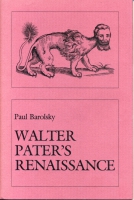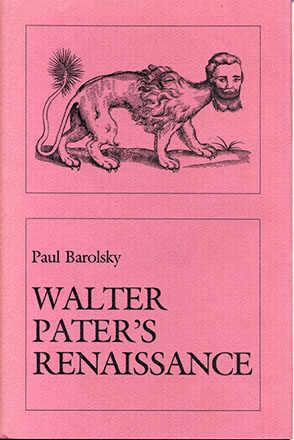Walter Pater’s Renaissance
Paul Barolsky
This highly original and learned book is the first to study in detail Walter Pater's The Renaissance and examine the literary traditions to which it belongs: poetry, fiction, history, and criticism. Exploring Pater's neglected playfulness—his uses of irony, paradox, and parody—it traces with sparkling wit and elegance Pater's relations to poetry from Baudelaire to Ashbery; to fiction from Hugo and Flaubert to Virginia Woolf and Nabokov. Pater's role in the history of modern criticism from Hazlitt and Gautier to Eliot, Berenson, Greenberg, and Clark is also considered, as is his influence on detective fiction and the related discipline of connoisseurship. We see here that Pater's historical definition of the Renaissance gradually became a metaphor of cultural renewal in the writing of the modernists. Pater's place in the tradition of "art history and criticism as literature" from Vasari through contemporary art-historical scholarship—is especially emphasized, and attention is paid to the ways in which Pater has shaped our current historical conception of the Renaissance.
- Description
- Bio
- Subjects
This highly original and learned book is the first to study in detail Walter Pater's The Renaissance and examine the literary traditions to which it belongs: poetry, fiction, history, and criticism. Exploring Pater's neglected playfulness—his uses of irony, paradox, and parody—it traces with sparkling wit and elegance Pater's relations to poetry from Baudelaire to Ashbery; to fiction from Hugo and Flaubert to Virginia Woolf and Nabokov. Pater's role in the history of modern criticism from Hazlitt and Gautier to Eliot, Berenson, Greenberg, and Clark is also considered, as is his influence on detective fiction and the related discipline of connoisseurship. We see here that Pater's historical definition of the Renaissance gradually became a metaphor of cultural renewal in the writing of the modernists. Pater's place in the tradition of "art history and criticism as literature" from Vasari through contemporary art-historical scholarship—is especially emphasized, and attention is paid to the ways in which Pater has shaped our current historical conception of the Renaissance.
Paul Barolsky is Chairman of the Mclntire Department of Art at the University of Virginia. He is the author of Daniele da Volterra: A Catalogue Raisonné (1979) and Infinite Jest: Wit and Humor in Italian Renaissance Art (1978).
Mailing List
Subscribe to our mailing list and be notified about new titles, journals and catalogs.




